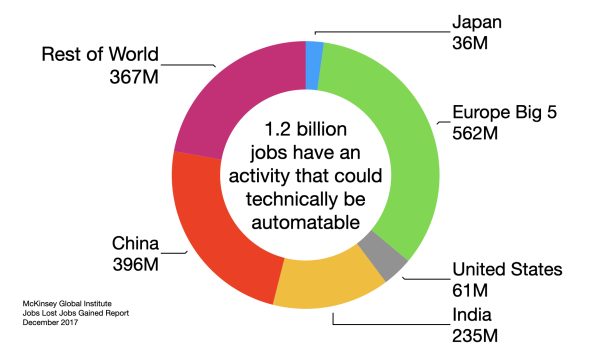Search for answers or browse our knowledge base.
Will AI take over my job?
0 out of 5 stars
| 5 Stars | 0% | |
| 4 Stars | 0% | |
| 3 Stars | 0% | |
| 2 Stars | 0% | |
| 1 Stars | 0% |
No consensus
There’s no general agreement among economic analysts and commentators on the scale and timing of job loses. Many believe that this will be no different from other periods in history, such as the Industrial Revolution, where new jobs were created and prosperity improved.
Others such as Klaus Schwab, Founder and Executive Chairman of the World Economic Forum, take the view that we’re entering a fourth Industrial Revolution. He believes that it will be quite different from other revolutions in industry, such as the introduction of steam power, electricity and electronics.
We stand on the brink of a technological revolution that will fundamentally alter the way we live, work, and relate to one another. In its scale, scope, and complexity, the transformation will be unlike anything humankind has experienced before.
Klaus Schwab
Executive Chairman WEFIndustrial Revolution
In the Industrial Revolution the impact was mostly on skilled workers as mechanization displaced people such as weavers in the textile industry. A group of artisans, calling themselves the Luddites, smashed machinery in protest at what they saw as a threat to their livelihoods.
Economists have traditionally rejected the notion that automation decreases employment, claiming a lack of evidence for this. The term ‘Luddite’ is now used as a derogatory term for those opposed to ‘progress’.
The machinery revolution in the eighteenth and nineteenth centuries brought employment to unskilled workers, albeit mostly women and children, working long shifts, often in hazardous environments. More manual jobs were created in mining and con- struction, and new skills were required in areas such as accounting, management and equipment maintenance.
The speed of current breakthroughs has no historical prece- dent. When compared with previous industrial revolutions, the Fourth is evolving at an exponential rather than a linear pace. Moreover, it is disrupting almost every industry in every country. And the breadth and depth of these changes herald the transformation of entire systems of production, management, and governance.
Klaus Schwab
Executive Chairman WEFReplicating human skills
AI is now influencing human-acquired skills such as driving a vehicle or piloting a drone.
Medical robots, still operated by experts, are assisting in delicate operations. At what point might a machine be able to replace a highly skilled surgeon for such tasks?

Encroaching on creativity
Many cognitive or skilled tasks, previously carried out by humans, are now carried out by AI algorithms, from data analysis in account- ancy to medical image interpretation, as we saw in chapter 5. Even areas that we would have thought of as creative, such as journalism, are influenced by software that can compile news reports from basic facts. Other creative areas also, such as music composition or art, aren’t untouched by developers’ aspirations to stretch the boundaries of what can be done.
A majority of AI today is driven at an accelerated pace because it can be built before we decide if it should be.
John Havens
'Heartificial Intelligence', 2016Pew Research Center
More worry than optimism amongst US adults about a future where robots and computers can do many human jobs. (2017 survey)
Work gives dignity
From a Christian perspective, we were created to work and although automation should replace people doing dangerous work, most people want to work rather than be at leisure.
Pew Research Center
Most teens say having a job or career they enjoy would be extremely important to them as adults (2018 survey of 13-17 teens).
Some have proposed the idea of a Universal Basic Income to allow people who can’t get work to have a basic standard of living. This, they argue, would allow them to pursue other interests such as hobbies. Others suggest that people replaced by AI and robots could re-skill and find other work, such as that requiring soft skills like caring for others. The challenge with this view is that many that are displaced may not have these soft skill nor opportunities to re-train.
References
John Havens, Heartificial Intelligence – Embracing Our Humanity to Maximise Machines (New York: Penguin Books, 2016), p. 72.
Klaus Schwab, The Fourth Industrial Revolution: What It Means, How to Respond, World Economic Forum, 14 January 2016, retrieved on 28 April 2020 from <https://www.weforum. org/agenda/2016/01/the-fourth-industrial-revolution-what-it-means-and-how-to-respond>.
Pew Research Center, October, 2017, “Automation in Everyday Life”
Pew Research Center, February 2019, “Most U.S. Teens See Anxiety and Depression as a Major Problem Among Their Peers”
World Economic Forum, Positive AI Economic Futures, Insight Report, November 2021.
0 out of 5 stars
| 5 Stars | 0% | |
| 4 Stars | 0% | |
| 3 Stars | 0% | |
| 2 Stars | 0% | |
| 1 Stars | 0% |